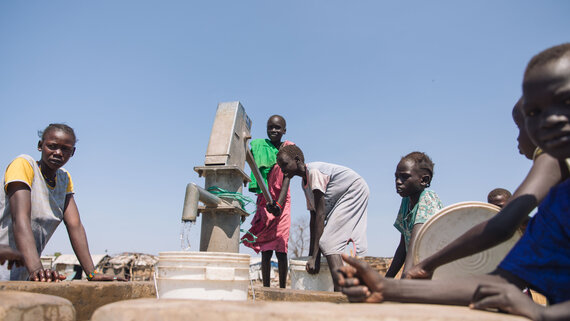WASH Sectoral People in Needs
WASH Sectoral Severity of Needs
Needs
Approximately 5.6 million people will require WASH assistance in 2024. The situation is particularly severe in Manyo, Upper Nile State, where the FSNMS data indicates alarming statistics of 99 percent of the population lacking access to improved water sources and 96 percent lacking improved sanitation facilities. More than 60 percent of women and girls in Manyo County feel unsafe when fetching water. Data also indicates that 28 counties have extreme WASH conditions while 40 are in severe conditions, often coinciding with high malnutrition rates. A significant portion of the population (41 percent) lacks access to improved water sources, and 37 percent need to travel over 30 minutes to reach their primary water source, posing particular hardships for persons with disabilities and making women and girls more vulnerable to GBV. Access to sanitation is even more limited with prevalent open defecation, as 88 percent of the population lacks access to improved latrines, according to the 2023 FSNMS data. The compounding challenges of displacement, insecurity, flooding, economic difficulties, and the influx of returnees from Sudan further strain the already limited resources.
WASH Sectoral People Targeted
Response
In 2024, the WASH Cluster's strategy will focus on integrated responses, particularly in high-priority counties experiencing acute vulnerabilities in both WASH and malnutrition, often compounded by high WASH-related GBV. These high-priority counties include Fangak, Fashoda, Rubkona, Melut, Panyikang, Luakpiny/Nasir, Leer, Canal/Pigi, Ayod, Cueibet, Akobo, Manyo and Pibor. Partners will collaborate with nutrition counterparts to extend sustainable access to safe WASH promotion in these communities and nutrition facilities.
The cluster aims to respond swiftly to sudden-onset disasters and will maintain integration with the health cluster to prevent WASH-related epidemics. Infection prevention and control measures are pivotal in both health facilities and communities. An immediate phase, lasting at least three months, will prioritize alleviating the suffering through minimal hardware interventions, rehabilitation of existing systems, water quality testing, distribution of WASH NFIs, and promoting safe hygiene practices. The core pipeline and rapid response teams will be used to respond swiftly to emergencies. Flood-prone or flood affected areas will receive resilient WASH infrastructure. Rehabilitation projects will only be approved if flood-resilient designs are specified, with Manyo County in Upper Nile as a top priority due to catastrophic WASH infrastructure conditions. For IDP sites, an exit strategy involving semi-permanent solutions will be initiated within six months of site establishment, aiming for a complete exit within two years with a maintenance handover to IDPs. The cluster will support the response to returnees from Sudan in transit centers, addressing their immediate WASH needs.
Safety audits to address WASH-related GBV are compulsory in long-term projects. Disability inclusion is also mandatory, ensuring that individuals with disabilities have access to WASH services. These measures will contribute to a comprehensive and responsive approach to WASH needs in South Sudan, including the challenges posed by conflicts, displacement, and disasters.
"Did you know that I can wash my hands well because of this water?"
- 5 year old boy in washing facility in Naivasha camp, Wau, Western Bahar al Ghazal

Rubkona County, Unity State
Displaced people collect water from a water point funded by the Central Emergency Response Fund in Kuermandoke area in the Bentiu IDP site B.
OCHA/Sarah WaiswaMonitoring
In 2024, the WASH Cluster will enhance its monitoring efforts through the 5W reporting mechanism, monthly dashboards, and gap analysis to track HRP progress. A new accountability and quality assurance module, already piloted, will be integrated into the monitoring framework. This module includes questions on the quality of outputs, outcomes, and beneficiary satisfaction. Furthermore, the cluster will intensify project-level monitoring to identify any deviations from cluster standards, guidelines, and requirements. These measures will bolster accountability, quality, and compliance within the WASH cluster's operations.

